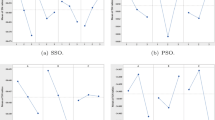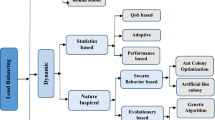Abstract
In this study, we address the meta-task scheduling problem in heterogeneous computing (HC) systems, which is to find a task assignment that minimizes the schedule length of a meta-task composed of several independent tasks with no data dependencies. The fact that the meta-task scheduling problem in HC systems is NP-hard has motivated the development of many heuristic scheduling algorithms. These heuristic algorithms, however, neglect the stochastic nature of task execution times in an attempt to minimize a deterministic objective function, which is the maximum of the expected values of machine loads. Contrary to existing heuristics, we account for this stochastic nature by modeling task execution times as random variables. We, then, formulate a stochastic scheduling problem where the objective is to minimize the expected value of the maximum of machine loads. We prove that this new objective is underestimated by the deterministic objective function and that an optimal task assignment obtained with respect to the deterministic objective function could be inefficient in a real computing platform. In order to solve the stochastic scheduling problem posed, we develop a genetic algorithm based scheduling heuristic. Our extensive simulation studies show that the proposed genetic algorithm can produce better task assignments as compared to existing heuristics. Specifically, we observe a performance improvement on the relative cost heuristic (M.-Y. Wu and W. Shu, A high-performance mapping algorithm for heterogeneous computing systems, in: Int. Parallel and Distributed Processing Symposium, San Francisco, CA, April 2001) by up to 61%.
Similar content being viewed by others
References
T.D. Braun et al., A comparison study of static mapping heuristics for a class of meta-tasks on heterogeneous computing systems, in: IPPS/SPDP Workshop on Heterogeneous Computing, San Juan, Puerto Rico (April 1999) pp. 15–29.
M.-Y. Wu, W. Shu and H. Zhang, Segmented min-min: A static mapping algorithm for meta-tasks on heterogeneous computing systems, in: IPDPS Workshop on Heterogeneous Computing, CancÚn, Mexico (May 2000) pp. 375–385.
M.-Y. Wu and W. Shu, A high-performance mapping algorithm for heterogeneous computing systems, in: International Parallel and Distributed Processing Symposium, San Francisco, CA (April 2001).
R. Armstrong, D. Hensgen and T. Kidd, The relative performance of various mapping algorithms is independent of sizable variances in runtime predictions, in: IPPS/SPDPWorkshop on Heterogeneous Computing, Orlando, FL (March 1998).
S.M. Figueira and F. Berman, A slowdown model for applications executing on time-shared clusters of workstations, IEEE Trans. Parallel and Distributed Systems 12 (June 2001) 653–670.
T. Kidd and D. Hensgen, Why the mean is inadequate for accurate scheduling decisions, in: The Proceedings of the 4th International Symposium on Parallel Architectures, Algorithms, and Networks, Perth, Australia (June 1999).
M.H. Balter, M.E. Crovella and C.D. Murta, On choosing a task assignment policy for a distributed server system, Journal of Parallel and Distributed Computing 59 (1999) 204–228.
G. Weerasinghe, I. Antonois and L. Lipsky, An analytic performance model of parallel systems that perform N tasks using P processors that can fail, in: International Symposium on Network Computing and Applications, Cambridge, MA (February 2002).
J.H. Holland, Adaptation in Natural and Artifical Systems (Univ. of Michigan Press, 1975).
D. Beasley, D.R. Bull and R.R. Martin, An overview of genetic algorithms: Part 1, fundamentals, University Computing 15 (February 1993) 58–69.
G. Rudolph, Convergence analysis of canonical genetic algorithms, IEEE Trans. Neural Networks 5 (January 1994) 96–101.
D.E. Goldberg and K. Deb, A comparative analysis of selection schemes used in genetic algorithms, in: Foundations of Genetic Algorithms (Morgan Kaufmann, 1991) pp. 69–93.
L. Wang, H.J. Siegel, V.P. Roychowdhury and A.A. Maciejewski, Task matching and scheduling in heterogeneous computing environments using a genetic-algorithm-based approach, Journal of Parallel and Distributed Computing 47 (November 1997) 8–22.
D.W. Scott, Multivariate Density Estimation: Theory, Practice, and Visualization (Wiley, New York, 1992).
C.H. Sauer and K.M. Chandy, Computer Systems Performance Modeling (Prentice-Hall, Englewood Cliffs, NJ, 1981).
H. Stark and J.Woods, Probability, Random Processes, and Estimation Theory for Engineers (Prentice-Hall, Englewood Cliffs, NJ, 1994).
S. Ali, H.J. Siegel, M. Maheswaran, D. Hensgen and S. Ali, Task execution time modeling for heterogeneous computing systems, in: IPDPS Workshop on Heterogeneous Computing, CancÚn, Mexico (May 2000) pp. 185–199.
P.A. Dinda, Online prediction of the running time of tasks, Cluster Computing 5 (2002) 225–236.
Author information
Authors and Affiliations
Rights and permissions
About this article
Cite this article
Doğan, A., Özgüner, F. Genetic Algorithm Based Scheduling of Meta-Tasks with Stochastic Execution Times in Heterogeneous Computing Systemst1. Cluster Computing 7, 177–190 (2004). https://doi.org/10.1023/B:CLUS.0000018566.13071.cb
Issue Date:
DOI: https://doi.org/10.1023/B:CLUS.0000018566.13071.cb




